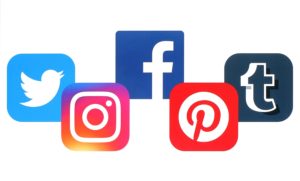 Many years ago when my son still lived at home, and was on hand to explain the mysteries of social media to me (MySpace anyone?) he advised me to forget about Facebook. “Don’t bother, Mom. It’s not for you.” Knowing me as the introverted and socially awkward person that I am, he added: “I can just see you getting a ‘friend request’ and going, “Oh my God! No!””
Many years ago when my son still lived at home, and was on hand to explain the mysteries of social media to me (MySpace anyone?) he advised me to forget about Facebook. “Don’t bother, Mom. It’s not for you.” Knowing me as the introverted and socially awkward person that I am, he added: “I can just see you getting a ‘friend request’ and going, “Oh my God! No!””
Best for Authors
He wasn’t far off the mark. So, I was a little dismayed when, after twenty years, I decided to return to writing fiction, and discovered authors are now expected to “engage” in all manner of interaction on social media. Son – to the rescue again – decided I’d like Twitter and signed me up. He was right. I do like it. Actually, I love it. And, I think other authors and writers love it, too. Here’s 6 reasons why:
1. Tweets Are Not Manuscripts
 They are simple and short. It means we can scroll through them quickly. Even better, we can compose and write 140 characters –about anything– standing in the supermarket checkout line (and, if the line’s long enough, we can usually throw in a nice photo, too.) We don’t find ourselves staring at a blank page on our laptops for hours as we might do when writing another chapter or a post for our websites.
They are simple and short. It means we can scroll through them quickly. Even better, we can compose and write 140 characters –about anything– standing in the supermarket checkout line (and, if the line’s long enough, we can usually throw in a nice photo, too.) We don’t find ourselves staring at a blank page on our laptops for hours as we might do when writing another chapter or a post for our websites.
We don’t need themes. We don’t even have to be original. If we like someone’s else’s tweet, we can simply retweet (regurgitate) it. If we love someone else’s tweet, we can use the “quote tweet” feature and add a comment explaining why — and then earn a “like” or “retweet” from the original author which may expose us to the original author’s thousands of followers.
Note to Twitter from me, and thousands of others (see example below): Please, please, please do NOT allow tweets to expand to 280 characters!!!
As enticing as it may sound, the notion of having #280characters will make tweets less interesting & succinct. Besides, who ever runs out of
— BrooklynDad_Defiant! (@mmpadellan) September 27, 2017
2. A Custom Made Community
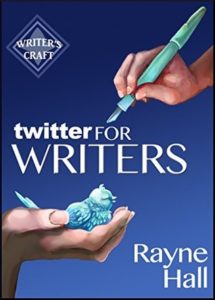 “By choosing who to follow, you’re indirectly choosing what kind of people follow you,” says Rayne Hall in her book, Twitter For Writers. True. You get to construct a community for yourself where you’re going to meet the kind of people with whom you’d actually want to hang out. For example, I chose to follow some bestselling psychological thriller authors whose books I have enjoyed. But I have also found thousands of writers, like myself, who have not hit the bestseller lists yet. Somehow, they also find me.
“By choosing who to follow, you’re indirectly choosing what kind of people follow you,” says Rayne Hall in her book, Twitter For Writers. True. You get to construct a community for yourself where you’re going to meet the kind of people with whom you’d actually want to hang out. For example, I chose to follow some bestselling psychological thriller authors whose books I have enjoyed. But I have also found thousands of writers, like myself, who have not hit the bestseller lists yet. Somehow, they also find me.
As Paul Anthony Jones writes in the Huffington Post: “Twitter can be a superb resource for sharing and collaborating. Follow the big authors, but don’t ignore those further down the tree. They could prove the most fascinating and useful new contact of all.” Again, true. I’ve found worthwhile writing tips, advice, laughs and sometimes inspiration in the tweets of authors I’d never heard of before Twitter.
I’ve discovered new authors and writers (and interesting articles as a result) by using my favorite genres as #hashtags. For example, #domestic noir introduced me to a couple of Australian authors, and an English author, Julia Crouch, who tweeted a link to an article in the North Texas Daily about “the rise of unlikeable women in psychological thrillers.” Right up my alley!
Interesting article (and first ever Texan name check for me) on #DomesticNoir https://t.co/r0JapVfRC2
— Julia Crouch (@thatjuliacrouch) August 3, 2017
Heidi Pitlor, another Huffington Post contributor writes that it sometimes seems that there are more people wanting to write than to read, but she adds, “all those writers and writers-in-training are usually great readers … to whom you can promote your books. Which brings me to Twitter as :
3. Best Promotional Tool
Rayne Hall, in her book, states without hesitation that, “Twitter is an excellent medium for promoting books. It certainly works for me — better than any other social media, better than advertising, better than anything else I have tried.”
In following some bestselling authors, you get an idea of what works promotionally for them, and what could work for you. Rachel Abbott, the most successful self-published author in the UK, tweets all the time: sometimes her tweets are one-line excerpts from her books; sometimes, they are news about a giveaway or discount on one of her books; and sometimes they are excerpts from reviews of her thrillers, like here:
5 Star Review: "WOWIE can this author tell a tale. Awesome." #StrangerChild https://t.co/vJecKkWsw4
— Rachel Abbott (@RachelAbbott) September 29, 2017
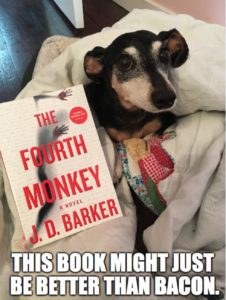
Abbott retweets tweets from fans, and book bloggers and reviewers who focus on and enjoy those types of thrillers. These are Tweeters you can choose to follow and who have websites and contact pages so that when it comes time to promote your own work, you could query them about your own novel.
Another bestselling author who has used Twitter to his best advantage is J.D. Barker, (@jdbarker) author of The Fourth Monkey, which I nominated for the best thriller of the Summer. I wrote about J.D.’s promotional efforts on Twitter, and at the time did a quick survey of what tweets drew the most likes and comments for him. Turned out, giveaways are always good, but there’s nothing like having a great-looking pet who doesn’t mind posing next to your masterpiece.
You can also look for reviewers of your own genre among the hundreds of book bloggers on Twitter by using #bookblogger. But read profiles first, and check out websites and tweets to make sure that the blogger reads and reviews books in your genre — and that he/she is still accepting books and arcs for review.
4. Rich Source For Tips & Advice
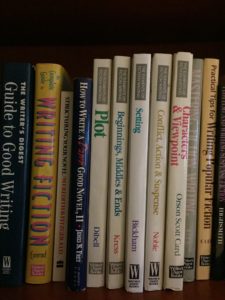 Used to be, twenty years ago when my first two thrillers were published, any advice or information about writing a book would generally come from … a book. Today there are hundreds, if not thousands of blogs, websites and columns dispensing advice on the craft of writing, on publishing, and on marketing.
Used to be, twenty years ago when my first two thrillers were published, any advice or information about writing a book would generally come from … a book. Today there are hundreds, if not thousands of blogs, websites and columns dispensing advice on the craft of writing, on publishing, and on marketing.
I have created a public Twitter list, On Writing/Publishing, in which I have collected the Twitter accounts of websites that dispense advice, tips and information on writing. Some of them are brand- new websites like the terrific careerauthors.com (@CareerAuthors); some of them were around as print magazines long before Twitter existed like writersdigest.com (@WritersDigest) Some of the advice on certain topics is familiar. Not all the advice is useful. However, if you’ve been around the publishing scene a long time, like I have, you get a feeling about tips and advice that might work, and some ideas just sound better than others.
If you look at my Twitter feed, you will see some of my tweets are retweets or “quote tweets” of articles and advice which I found especially useful. Better still, by retweeting, liking or tweeting a comment, like the one below, I’ve stored that article in my own feed/timeline so I can reference it easily when I am looking for information on that particular topic.
Really, really forces you to focus on what your story is about. https://t.co/c0HlXSyrIN
— Joanna Elm (@authorjoannaelm) September 29, 2017
5. Terrific Timesaver
 Contrary to the idea that Twitter for authors, along with other social media , eats up time, and distracts and diverts attention from the task of writing, I find that it can actually save time depending on your other interests. As a former Fleet Street and tabloid journalist, I am a news junkie . Away from Twitter, I subscribe to five newspapers and a bunch of magazines which I like to read every morning. However, if I don’t have time for fully reading them all , running through my Twitter News list gives me quite a good idea of what is “trending,” or, in other words, what has happened in the world while I was asleep. I follow 58 news organizations on Twitter including newspapers, TV news channels, magazines, and news websites and, of course — (Sad!)– @realDonaldTrump.
Contrary to the idea that Twitter for authors, along with other social media , eats up time, and distracts and diverts attention from the task of writing, I find that it can actually save time depending on your other interests. As a former Fleet Street and tabloid journalist, I am a news junkie . Away from Twitter, I subscribe to five newspapers and a bunch of magazines which I like to read every morning. However, if I don’t have time for fully reading them all , running through my Twitter News list gives me quite a good idea of what is “trending,” or, in other words, what has happened in the world while I was asleep. I follow 58 news organizations on Twitter including newspapers, TV news channels, magazines, and news websites and, of course — (Sad!)– @realDonaldTrump.
6. And Yes, It’s Also Fun
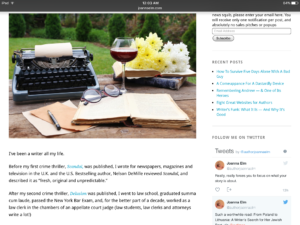
Social media has long been a subject of debate for authors and writers. Twitter for authors? How useful is it? Does it actually sell books? Is it as good as having a website and/or blog? Do you need both? From the hundreds of articles, blogs and websites I’ve read on the subject, I think it’s safe to say, no-one actually knows. Most experts will agree that it’s not the most important way to spend your time if you’re an author, but on the other hand “it can’t hurt.”
Publishing expert, Jane Friedman’s recent blog, on social media for authors, puts it in a perspective that I’ve understood since opening my Twitter account. Jane writes: “It works best when you can see it as play, as a natural extension of your work. As soon as you carve it out as the “marketing and promotion” part of work/life, your results may be lackluster.”
At the time I opened the account, I did not have a book ready for publication, so, I started tweeting in a spirit of experimentation. I was not in it to build a list of thousands upon thousands of followers — which is a good thing because as yet I have no idea how some Twitter accounts garner tens of thousands followers. But, of course, there are hundreds of posts on exactly that topic. Next time I have five minutes to spare maybe I’ll read a few of them, and maybe I’ll even retweet a couple. See you at @authorjoannaelm.
Photo Credits: bigstockphotos.com
Good stuff. Great tips. And it seems that there is a worthwhile use for Twitter after all. Not just a conduit for the digital diarrhea of our intellectually constipated tweeter-in-chief.
For that latter reason alone, let us all hope Twitter doesn’t extend its 140 character limit. Thank you for reading, George.